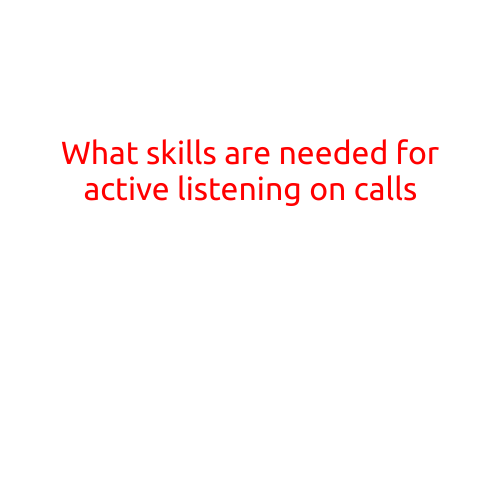
How to Handle Being Proactive on Calls
Being proactive on phone calls is a crucial skill that can make a significant difference in your professional and personal life. When you take the initiative to plan, prepare, and execute, you demonstrate confidence, enthusiasm, and a strong work ethic. In this article, we’ll explore the importance of being proactive on calls and provide tips on how to do it effectively.
Why Being Proactive on Calls Matters
In today’s fast-paced and competitive environment, being proactive on calls is essential to getting ahead. When you take charge, you:
- Take control: Proactivity allows you to steer the conversation and keep yourself and others on track.
- Show initiative: By being proactive, you demonstrate your ability to take initiative and lead, setting you apart from others.
- Build rapport: Proactivity shows that you’re interested in the other person and willing to invest time and effort in the conversation.
- Increase productivity: By being prepared and proactive, you can tackle tasks more efficiently and effectively, allowing you to focus on high-priority tasks.
Tips for Being Proactive on Calls
- Prepare in advance: Before the call, research the person, the topic, and the goals of the call. Review relevant documents, notes, and previous conversations to ensure you’re well-prepared.
- Set clear objectives: Define what you want to achieve from the call, including specific actions, decisions, or outcomes. This will help you stay focused and ensure the call stays on track.
- Start strong: Begin the call by stating the purpose and objective, and providing a brief summary of the topics you’ll be discussing.
- Listen actively: While being proactive, don’t forget to listen actively. Pay attention to the other person’s concerns, ideas, and perspectives to build trust and rapport.
- Take notes: Jot down key points, agreements, and action items during the call. This will help you stay organized, ensure you don’t miss important details, and enable you to reference the conversation later.
- Be flexible: Be prepared to pivot or adjust your plan if necessary. Proactivity doesn’t mean refusing to adapt – it means being able to respond effectively to changing circumstances.
- Follow up: After the call, follow up on any action items or promises made. This demonstrates your commitment to the conversation and helps maintain momentum.
Common Obstacles to Overcome
While being proactive on calls is essential, you may encounter obstacles that hinder your ability to do so. Common challenges include:
- Information overload: Too much information can overwhelm you, making it difficult to stay proactive. Prioritize the most important details, and focus on the key aspects of the conversation.
- Multiple tasks: Having to manage multiple tasks or responsibilities during the call can make it challenging to stay on track. Develop strategies to handle competing demands, such as prioritizing tasks or delegating responsibilities.
- Negative self-talk: Self-doubt or criticism can undermine your confidence, making it harder to be proactive. Practice mindfulness, focus on your strengths, and remind yourself of your abilities.
Conclusion
Being proactive on calls is a vital skill that can boost your confidence, productivity, and effectiveness. By preparing in advance, setting clear objectives, and staying focused, you can take control of the conversation and achieve your goals. Remember to listen actively, take notes, and be flexible, and don’t be afraid to overcome obstacles. With practice and persistence, you’ll become a master of being proactive on calls.





